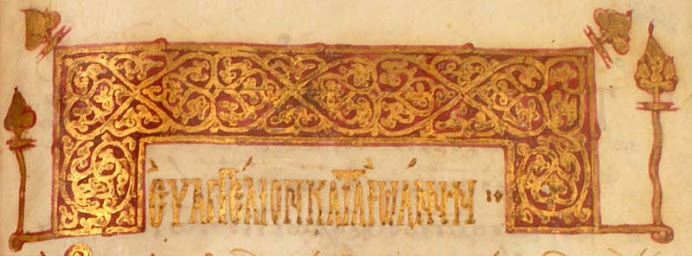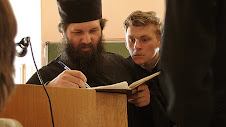 Those who have spent time in a monastery during Great Lent will recall that special works of the Fathers are read aloud during the daily services. Most often these works are The Ladder of Divine Ascent, The Lausiac History, and the Catecheses of St Theodore the Studite.
Those who have spent time in a monastery during Great Lent will recall that special works of the Fathers are read aloud during the daily services. Most often these works are The Ladder of Divine Ascent, The Lausiac History, and the Catecheses of St Theodore the Studite.I was particularly struck by the following passage, from catechesis 55, which I heard read aloud last week:
Perhaps some one will say that to eat every day is a failure of perfection. Not at all! Otherwise our Lord would not have ordered us to ask each day for our daily bread; the prophet Elias would not have been nourished each day in the desert by a raven; Paul, who dwelt in the desert before the godly Antony, would have received bread from God every day; Antony the Great preferred as almost necessary eating daily to a fast of above a day or for a week. And this is how it seems to me; for since our body is physically exhausted through its toil for the whole day, like a racing colt, and needs its rest, so necessarily the creator of our nature has arranged for it to be strengthened by its daily nourishment so that it might run well for the future, but not be exhausted and fading, which what they suffer who drag out their fast over two, three and five days. Nor would they be able to prostrate more frequently, not to join more lustily in psalmody, nor to accomplish their other services easily, unless something truly extraordinary happens. And so daily nourishment is not simply for the imperfect, but very much for the perfect by the traditional definition and canon. And thank goodness these things have been laid down by the fathers. And may you be granted again and again both health of body and strength of spirit to serve the living and true God and to await the last day, in which may you shine out like the sun as heirs of the kingdom of heaven, in Christ Jesus our Lord, to whom be glory and might, with the Father and the Holy Spirit, now and always and to the ages of ages. Amen.Translated by Archimandrite Ephrem (Lash) of the Monastery of St Andrew the First Called, Manchester, England.









No comments:
Post a Comment